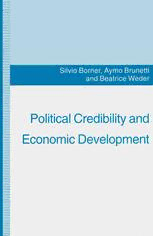Table Of ContentPOLITICALCREDIBILITY AND
ECONOMIC DEVELOPMENT
Alsoby Silvio Borner
INTERNATIONALFINANCEAND TRADEINA
POLYCENTRICWORLD(editor)
STRUCTURALCHANGE,ECONONUCINTERDEPENDENCE
AND WORLD DEVELOPMENT: Volume2 Natural and
Financial Resourcesfor Development(editor with A. Taylor)
THEEUROPEANCOMMUNITYAFTER 1992:Perspectives from
theOutside (editor with H.Grube!)
Political Credibility and
Economic Development
Silvio Borner
Aymo Brunetti
and
Beatrice Weder
©Silvio Bomer, Aymo Brunetti and Beatrice Weder 1995
Softcover reprint of the hardcover 1st edition 1995 978-0-333-61769-4
All rights reserved. No reproduction, copy or transmission of
this publication may be made without written permission.
No paragraph of this publication may be reproduced, copied or
transmitted save with written permission or in accordance with
the provisions of the Copyright, Designs and Patents Act 1988,
or under the terms of any licence permitting limited copying
issued by the Copyright Licensing Agency, 90 Tottenham Court
Road, London WIP9HE.
Any person who does any unauthorised act in relation to this
publication may be liable to criminal prosecution and civil
claims for damages.
First published in Great Britain 1995 by
MACMILLAN PRESS LTD
Houndmills, Basingstoke, Hampshire RG21 2XS
and London
Companies and representatives
throughout the world
A catalogue record for this book is available
from the British Library.
ISBN 978-1-349-24051-7 ISBN 978-1-349-24049-4 (eBook)
DOI 10.1007/978-1-349-24049-4
10 9 8 7 6 5 4
04 03 02 OJ 00 99 98 97
First published in the United States of America 1995 by
Scholarly and Reference Division,
ST. MARTIN'S PRESS, INC.,
175 Fifth Avenue,
New York, N.Y. 10010
ISBN 978-0-312-12376-5
Library of Congress Cataloging-in-Publication Data
Bomer, Silvio.
Political credibility and economic development I Silvio Bomer,
Aymo Brunetti and Beatrice Weder.
p. em.
Includes index.
ISBN 978-0-312-12376-5
I. Economic development. 2. Political stability. 3. Latin
America-Economic conditions-1982- 4. Asia, Southeastern-Economic
conditions. I. Brunetti, Aymo. II. Weder, Beatrice. III. Title.
HD75.B67 1995
338.9~c20 94-31775
CIP
Contents
Preface ix
Introduction xiii
PART I THE EFFECTSOFPOLITICALCREDIBILITY
ONGROWTH: THEORYANDEMPIRICAL
EVIDENCE
1 CatchingUp orFallingBehind? 3
Missed opportunities: expectations versus reality 3
Mainstreamgrowth theory:thecase forcatching up 6
Afirstlookattheevidence ofcatching up 8
Tacklingthepuzzle ofnon-convergence 11
Conditionalconvergence: asecond lookattheevidence 13
Political factors- themissing link? 14
2 Political Credibility:ACrucialFactorfor Growth 16
Thecredibility ofpoliticalsystems 16
Efficiency versuscredibility 18
Theprotectivestate 20
The problems ofstateless societies 20
The idealstate asthesolution 23
The discretionary state: lackofpolitical credibility 26
Private sector responses tolowpolitical credibility 28
Liquidity:lower levelsofinvestment 28
Informality: reducing marketsize 30
Growth costs of lowpolitical credibility 33
Levels of investment. marketsize and newtechnology 34
Summary 36
3 MeasuringPolitical Credibility 37
The mixed evidencefromcurrent political variables 37
Democracyandeconomic growth 37
Political stability andeconomic growth 41
v
vi Contents
Summary oftheshortcomings ofexisting political
measures 44
Seeking bettermeasurement of thequality ofpolitical
systems 47
Constitutions 47
Political experts 48
Business indicators 49
Listening toentrepreneurs 50
Anindicator ofpoliticalcredibility 51
Constructionof thepolitical credibility indicator 54
Discussion ofthepolitical credibility indicator 55
Summary 61
4 PoliticalCredibilityandEconomicGrowth:The
EmpiricalEvidence 62
Growth effects ofpolitical credibility 63
Testing theeffect ofpolitical credibility oneconomic
growth 63
Different growth channels ofpoliticalcredibility 65
Political credibility versusother political variables 69
Alternative political indicators 69
Resultsof thecomparison 70
Summary 71
PARTII THESOURCESOFPOLITICALCREDIBILITY
5 ExplainingPoliticalCredibility:Conceptual
Foundations 75
ControIling thecontroller 75
Three sources ofcredibility: ataleof banditry 77
Roving bandits: nocredibility 77
Settled bandits: credibility throughreputation 78
Competing bandits:credibility throughopenness 79
Nobandits:credibility throughparticipation 80
Credibility through reputation: internal withdrawal 80
Thequestion ofsurvival 82
Severity ofpunishment throughinternal withdrawal 83
Formsofcredibility throughreputation 83
Contents vii
Credibilitythrough openness: exit 91
Direct. short-termcredibilityeffects ofopenness 92
Indirect. long-term credibilityeffects ofopenness 94
Problemsofcredibility through openness 95
Forms ofcredibilitythrough openness 95
Credibility through participation 97
Problemsofcredibilitythrough participation 98
Forms ofcredibility through participation 99
Summary 104
6 SourcesofPoliticalCredibilityinTen Countries 105
Measuring thethree mechanisms 106
Measuringreputation 106
Measuringopenness 106
Measuringparticipation 107
Individual country charts andexplanations 108
Singapore 108
Malaysia 113
Thailand 116
Indonesia 120
Chile 123
Bolivia 127
Venezuela 130
Peru 134
Guatemala 138
Argentina 142
Types ofcountries 145
AAAcountries 145
ABC countries 146
CCC countries 147
7 Implicationsfor Policy Reform 149
The traditional approach: Washington consensusonpolicy
reform 149
Prudent macroeconomicpolicies 151
Outward orientation 152
Free markets 153
viii Contents
Institutions:theneglecteddimensionintheWashington
consensus 154
ThecaseofNicaragua 154
Recent advancesininstitutionalreform 157
The top-downapproach 158
Thebottom-upapproach 162
Howtoestablish politicalcredibility 165
AppendixI: TheNeoclassical ModelofEconomic
Growth 169
Appendix2: PrivateSectorQuestionnaire 172
Appendix 3: IndicatorofPolitical Credibility 178
Appendix4: Measurementand IndicatorsofOpenness 179
NotesandReferences 186
Bibliography 198
Index 207
Preface
Youcan make money under anypolicy situation aslongasitdoesn't
changeevery fifteen minutes.'
This quotation summarises what this book is all about. From personal
interviews with dozens of entrepreneurs in different less developed
countries (LDCs) we have reached the conclusion that much oftradi
tionaldevelopmentanalysis ismissing an important point. Forpotential
private investors the most important and basic characteristic of any
policy is that it is stable and predictable. Concern about the efficiency
of policies is certainly important for long-term development. But in
political systems where implemented policies are inconsistent or not
enforced,are cancelledor turned upside down from one moment tothe
next,the best-designedreforms arein vain.Arule thatlackscredibility
and is notenforced is meaningless. In the reforming Eastern European
countries ithas beenclearly acknowledged thatstableproperty rights or
institutions are the most important precondition fordevelopment based
on private-sectoractivity.Weargue that verysimilarproblems exist in
a large number of LDCs: uncertain property rights. unstable rules,
unpredictable regulations- inshort theabsence ofameaningful ruleof
law - regularly prevent the hoped-for private-sector reaction to the
reforms implemented under IMF and World Bank programmes. In
short.andtointroduceour keyconcept,whatmany LDCslack ispoliti
calcredibility. asprivate business doesnotbelieve inthestability ofthe
rulessetand enforced bythestate.Weconclude thatestablishing politi
cal credibility is a necessary precondition for economic growth. the
goalofour research being toquantify and testthelinkbetweenpolitical
credibility and economic growth, focusing onthemeasurableeconomic
dimension of thedevelopmentprocess.
This book is not only the result ofajoint effort by the authors - a
large numberofpeopleand institutions rendered our (ad)ventureposs
ible inthe firstplace.Asmall teamsuch asours. addressingsuch a big
question.required thesupportandhelpofmany.
In order better to understand the sources ofpolitical credibility we
submitted a comprehensivepolitical questionnaire to legal scholars in
a number of countries. and we thank the following contributors for
ix

